CE-MS
ZipChip
Rapid protein characterization and metabolomic analysis with microfluidic technology for highly efficient separations of complex samples. Simplify sample preparation, reduce analysis time, and achieve faster results.
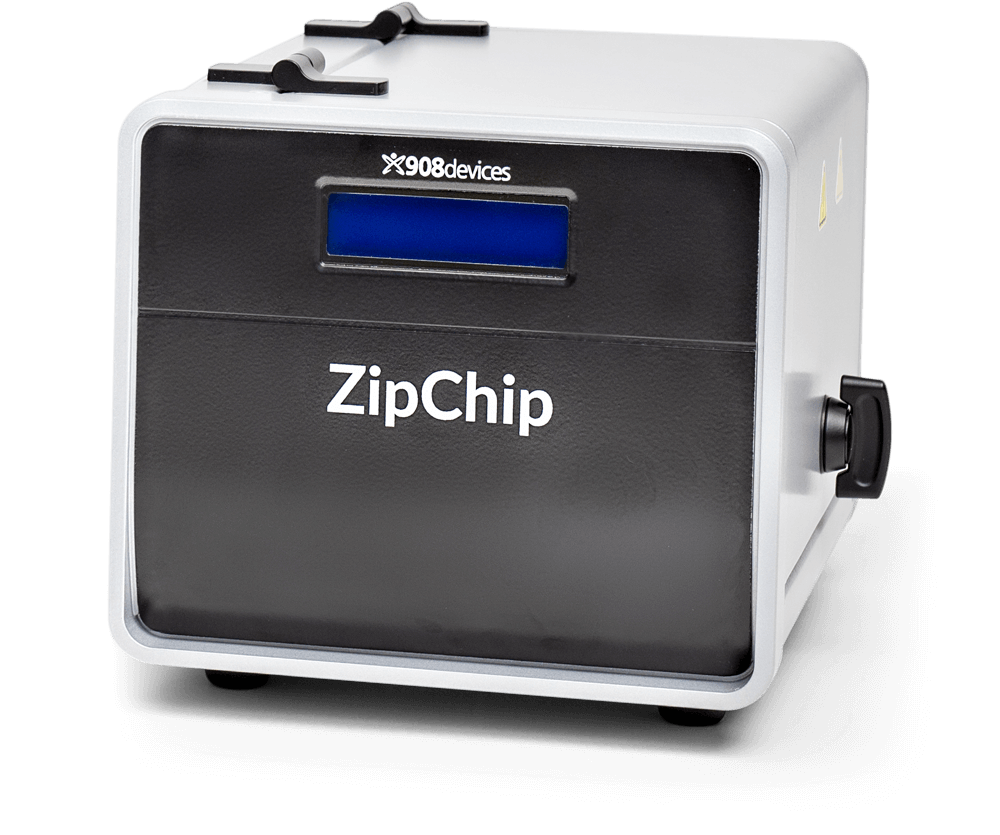
Simple 3-step workflow to data
Unambiguous detection of analytes in low quantities
Analyze many sample types from small to large molecules
ZipChip is a high-resolution microchip CE-MS device. It efficiently separates and seamlessly introduces samples into your mass spectrometer with electrospray ionization (ESI). Common challenging analyses are made easy, including protein separation for biopharmaceutical critical quality attributes (CQA), Charge Variant Analysis, and metabolite quantification from biological matrices. Experience a powerful alternative to liquid chromatography mass spectrometry (LC MS).
Rapid Analysis of Critical Quality Attributes (CQAs)
ZipChip facilitates the efficient, accurate, and comprehensive analysis of CQAs through several key features. Rapid analysis supports the development and manufacturing of high-quality products in the pharmaceutical and biopharmaceutical sectors. ZipChip facilitates CQA measurement with Charge Variant Analysis, Intact Mass, Peptide Mapping, and Reduced/Subunit analysis. The ability to rapidly and precisely analyze a wide range of samples makes ZipChip an invaluable tool to ensure product quality and safety.
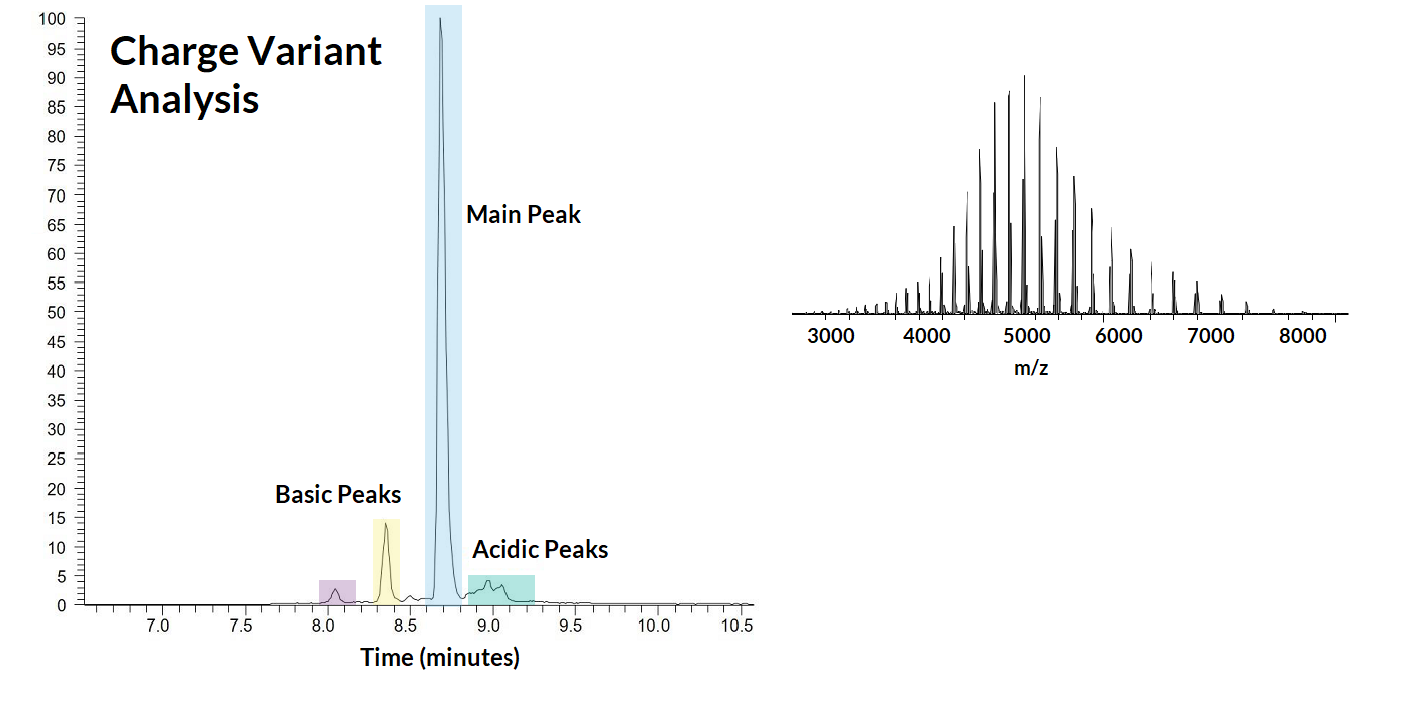
High-Resolution Separation
ZipChip utilizes capillary electrophoresis (CE) integrated with mass spectrometry (MS). This combination allows for high-resolution separation of complex mixtures based on charge-to-mass ratios. It can differentiate and analyze molecules that may be challenging to distinguish using other techniques. This makes it highly effective for the assessment of critical quality attributes (CQAs) such as post-translational modifications in proteins, peptide mapping, and the analysis of small molecules.
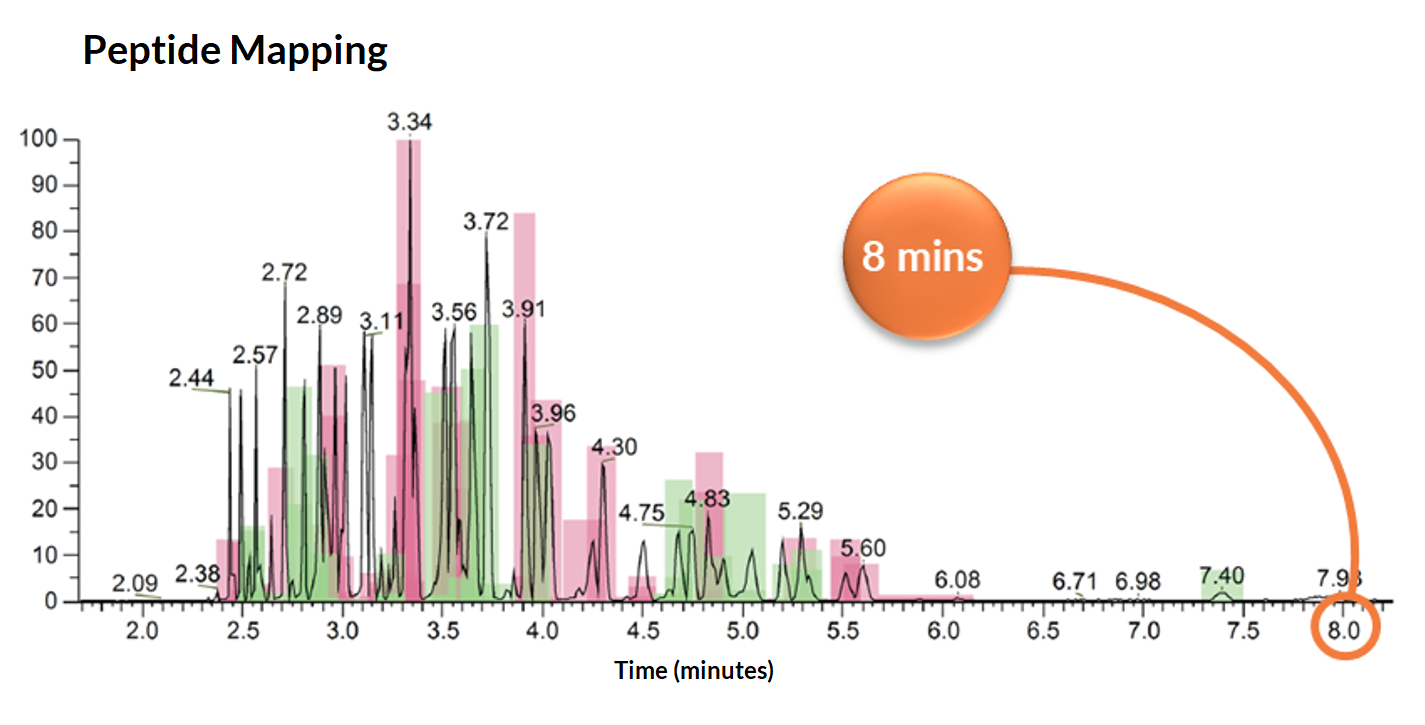
Rapid Analysis
Significantly reduce analysis time compared to traditional methods. ZipChip can perform analyses in minutes, whereas a traditional capillary electrophoresis instrument or liquid chromatography (LC) methods might take much longer. This rapid turnaround is crucial for timely decision-making in research and manufacturing processes. The image above shows peptide mapping of the NIST mAb, with analysis done on the ZipChip in under 8 minutes. This could take hours on an LC MS system.

Minimal Sample Preparation
ZipChip requires minimal sample preparation, which reduces the risk of sample loss or modification during preparation. This feature is particularly important for maintaining the integrity of the sample and ensuring accurate analysis of critical quality attributes (CQAs).
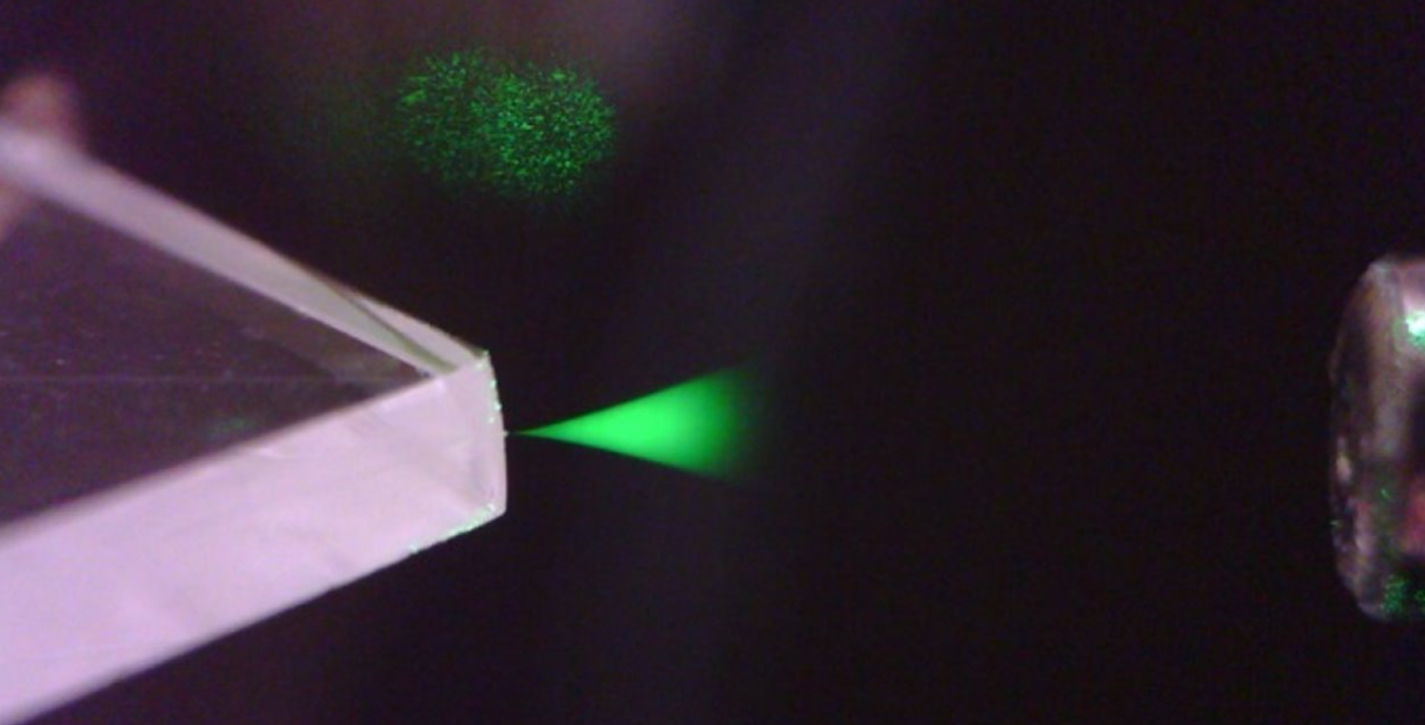
Integration with Mass Spectrometry
By integrating a capillary electrophoresis instrument with mass spectrometry, you receive detailed molecular information, including molecular weight and structural data, unlike UV-detection based capillary electrophoresis separations. This integration is invaluable for identifying and quantifying critical quality attributes (CQAs), understanding their impact on product quality, and ensuring regulatory compliance.
Versatility, Efficiency,
and Cost Effectiveness
Analyze a wide range of molecules, from small ions to large biologics. ZipChip is suitable for a diverse array of applications in the pharmaceutical and biopharmaceutical industries. This versatility allows for comprehensive analysis of multiple critical quality attributes (CQAs) across different stages of product development and manufacturing. Efficiency in terms of time and resource use, coupled with minimal sample requirements, makes ZipChip a cost-effective solution for routine development and research applications.

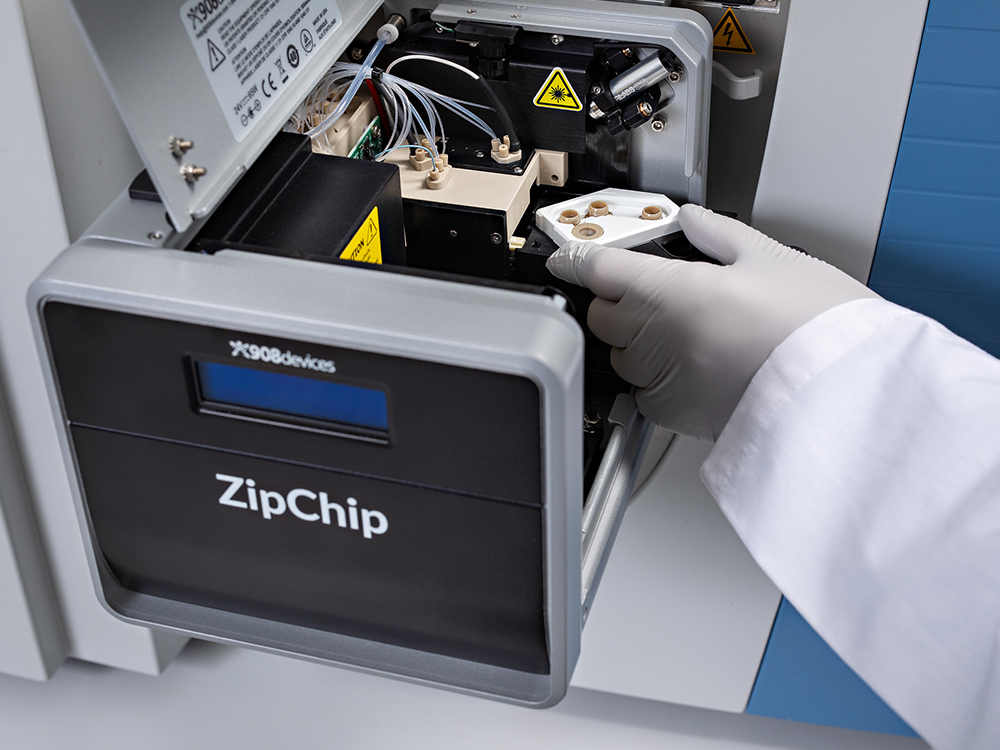
Sample Analysis Made Easy
With ZipChip CE-MS, there is no stationary phase or finicky method development to slow you down. The capillary electrophoresis (CE) separates molecules based on their size and charge in an open tube. This removes matrix effects from salts, negatively charged compounds, and lipids. Most protein analyses can occur with simple dilute-and-shoot preparation, and are sensitive below a microgram per mL for Charge Variant Analysis. Amino acids and other polar metabolites can be analyzed with only protein precipitation, without the hassle of SPE, derivatization, or dry-down and reconstitution. With ZipChip, you spend less time looking, and more time seeing.
Trusted by Biopharma and Research Institutions
Charge Variant Analysis
Hear from Dr. Sara Carillo from NIBRT on the unique advantages of ZipChip for charge variant analysis.
CE-MS Made Easy
Ying Ge from University of Wisconsin discusses how her laboratory was able to set up ZipChip CE-MS within minutes, and obtain high quality data with low carryover in less than half an hour from the start.
ZipChip Seamlessly Integrates
With Your Mass Spec
Thermo Fisher Scientific
- Orbitrap Exploris series
- Orbitrap Eclipse Tribrid
- Orbitrap Astral
- Orbitrap IQ-X and ID-X Tribrids
- Fusion Orbitrap Tribrid series
- Exactive & Q Exactive series
- LTQ & Orbitrap Elite series
- TSQ2 series Triple Quads
Bruker
- timsTOF & timsTOF Pro series
- maXis, impact, & compact QTOF series
Sciex
- TripleTOF 6600+, 6600, 5600
- Triple Quad/QTrap 6500+, 6500, 5500+, 5500, 4500
908 Devices has worked closely with Thermo Fisher Scientific, Bruker and Sciex to build specific ZipChip interfaces that directly connect to various mass spectrometers. Each system is designed such that the chip is oriented for optimal positioning on the MS inlet for the best sensitivity and ease-of-use. No adjustments required, so you can attach the ZipChip source and move forward with confidence. Click on the brands above to see if your mass spectrometry system is compatible with ZipChip.
Enhance Your Mass Spectrometer
Mass spectrometry (MS) is vital in the analysis of molecular compositions and structures. By ionizing sample molecules and measuring their mass-to-charge ratios, a mass spec can provide invaluable insights into fields as variable as pharmaceutical quality, clinical diagnostics, forensics, and geology. There’s even one on the Mars rover. However, on their own an MS system is limited by challenges like ionization suppression (which decreases sensitivity) and slow separations (which make the overall measurement time consuming and expensive). ZipChip addresses these limitations by separating compounds like metabolites, peptides and proteins in the liquid phase in an electric field. Because there is no stationary phase, and electrical separations are inherently simple, fast and reproducible, ZipChip serves as the perfect partner to get the most out of your mass spec.
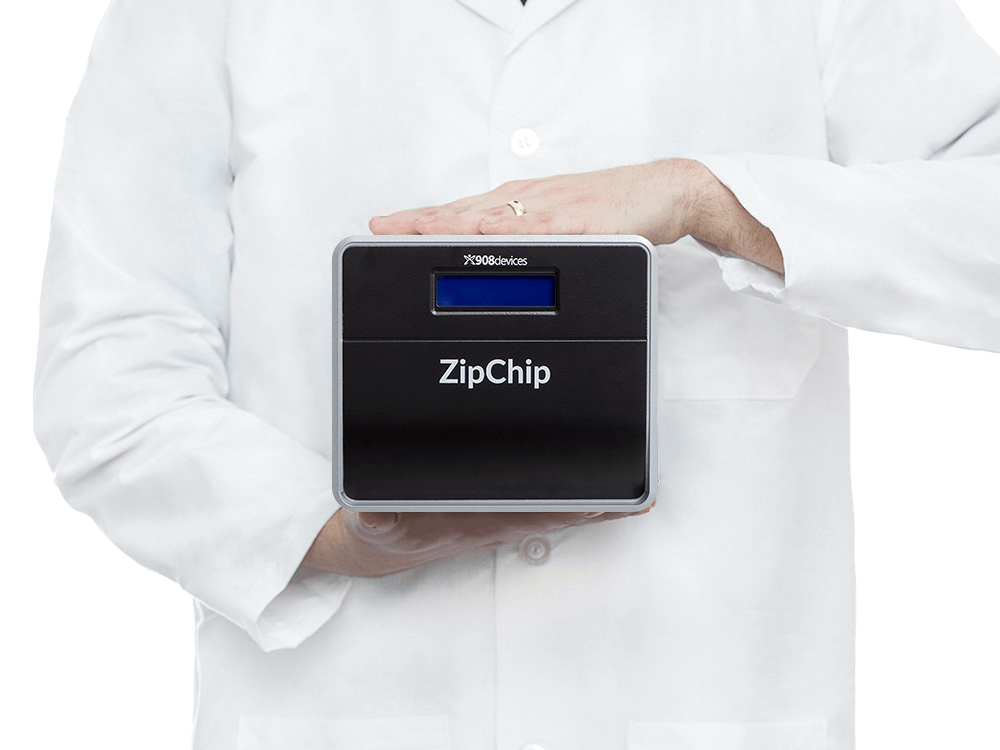
Charge Variant Analysis
Charge Variant Analysis (CVA) of monoclonal antibodies (mAbs) is crucial in biopharmaceutical development and quality control, ensuring the efficacy and safety of these therapeutic proteins. ZipChip plays a significant role in facilitating CVA by providing an advanced, efficient platform for analyzing the charge heterogeneity of mAbs. Here’s how the ZipChip assists in CVA of monoclonal antibodies:

Delivering high-resolution separation is essential for distinguishing between different isoforms of mAbs, including those with minor modifications that can significantly impact their therapeutic activity and immunogenicity.

Traditional methods for CVA, such as ion exchange chromatography, can be time-consuming. ZipChip streamlines this process, offering rapid analysis times compared to conventional techniques. This efficiency is particularly beneficial in high-throughput environments, where timely results can accelerate development cycles and decision-making processes.

By integrating CE-MS, ZipChip provides not only separation capabilities but also detailed molecular characterization of each charge variant. This integration allows for the identification and quantification of modifications such as deamidation, oxidation, and glycosylation, which can affect a mAb’s charge profile and, consequently, its function.

The ZipChip system requires minimal sample preparation, reducing the risk of sample loss or modification and preserving the integrity of delicate mAbs. This feature is crucial for maintaining the accuracy of CVA and ensuring reliable analysis results.

The sensitivity of the ZipChip, combined with its specificity in detecting charge variants, enables the detection and characterization of even minor populations of mAbs. This sensitivity is vital for identifying variants that could impact the safety or efficacy of the therapeutic product.

For biopharmaceutical companies, adhering to regulatory guidelines is paramount. The ZipChip’s capability for detailed and accurate CVA supports compliance with regulatory standards for biosimilar development, batch-to-batch consistency, and overall product quality control.

Besides mAbs, the ZipChip can analyze a wide range of biopharmaceuticals, making it a versatile tool for various stages of drug development and manufacturing processes. This versatility ensures that the investment in ZipChip technology benefits multiple projects and product lines within a company.

ZipChip enhances the analysis of charge variants in monoclonal antibodies making it the needed tool for research in fields like drug development and biological studies.
Address LC MS Metabolomics Constraints
Liquid Chromatography Mass Spectrometry (LC MS) is a commonly used method in the field of metabolomics, although it does have its drawbacks. By incorporating technologies like ZipChip, some of these obstacles can be overcome. This ultimately enhances the productivity and success of metabolomics studies. Learn more about the challenges of LC MS in metabolomics applications, and how ZipChip overcomes them.
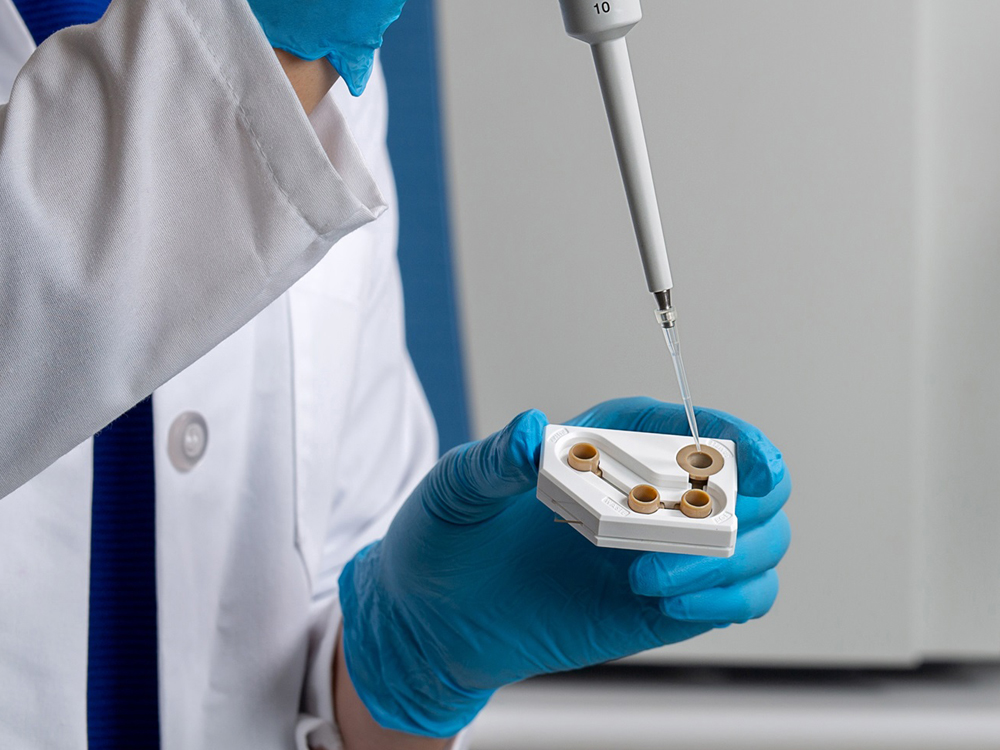
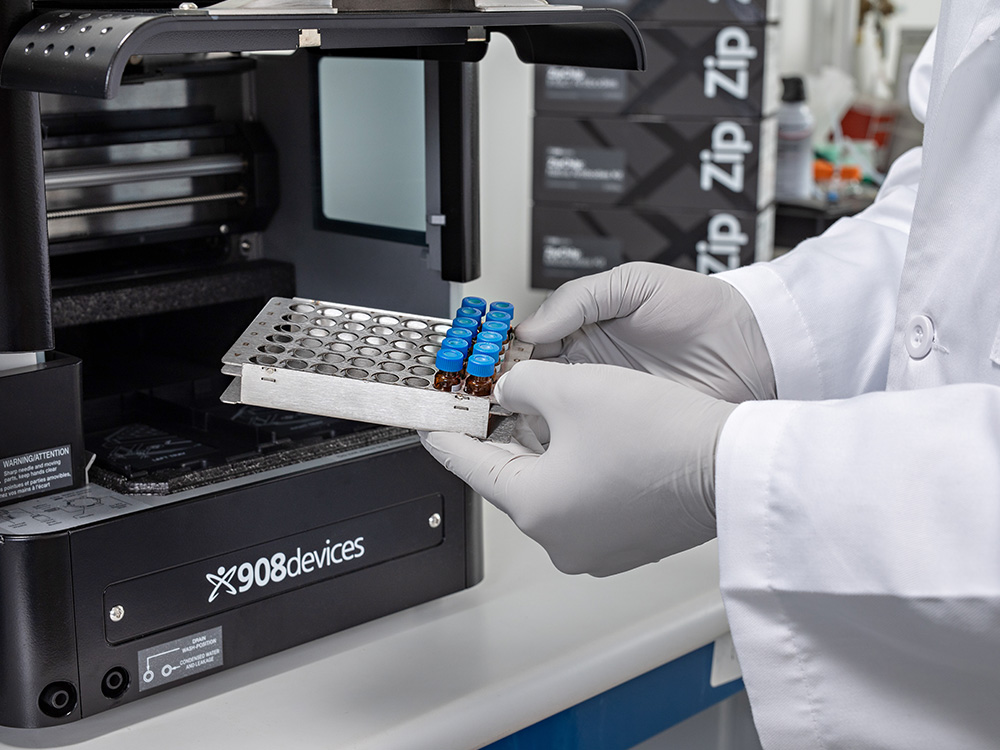
Take Guesswork Out Of Method Development
ZipChip consumables take the guesswork out of method development. Assay kits come with background electrolyte and sample diluent that’s optimized for each application. Just put the bottle of background electrolyte in the autosampler, prep your samples with the sample diluent and you’re off!
How to Find Your Assay & Consumables Kit:
Pick a BGE Kit
Then a Chip
How Will You Use ZipChip?
Featured Resources
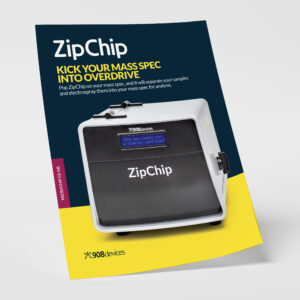
ZipChip Platform Brochure
Download our platform brochure to learn how ZipChip® platform prepares and separates a wide range of biological samples, then electrosprays them into your mass spec for analysis.
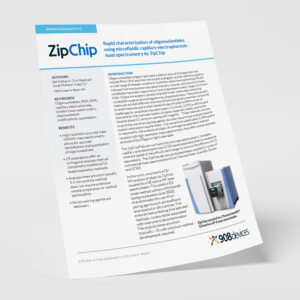
Rapid characterization of oligonucleotides using microfluidic CE-MS by ZipChip
This application note presents a CE-MS analysis of oligos by a ZipChip coupled to a QExactive HF mass spectrometer. This positive ESI mode method utilizes a MS-friendly background electrolyte (BGE), that eliminates the use of ion-paring agents such as hexafluoro isopropanol or alkyl amines.
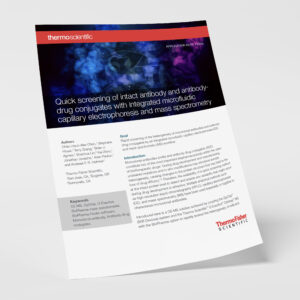
Quick screening of intact antibody and antibody drug conjugates with integrated microfluidic capillary electrophoresis and mass spectrometry
This application note shows a method for rapid screening of the heterogeneity of monoclonal antibodies and antibody drug conjugates by an integrated microfluidic capillary electrophoresis (CE) and mass spectrometry (MS) workflow.
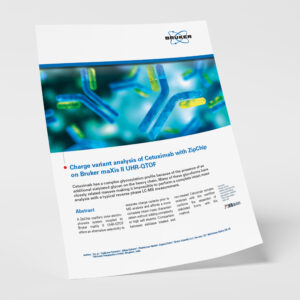
Charge variant analysis with ZipChip and maXisII
A ZipChip capillary zone electrophoresis system coupled to Bruker maXis II UHR-QTOF offers an alternative selectivity to separate charge variants prior to MS analysis and affords a more complete intact mass characterization without adding complexity or high salt eluents.
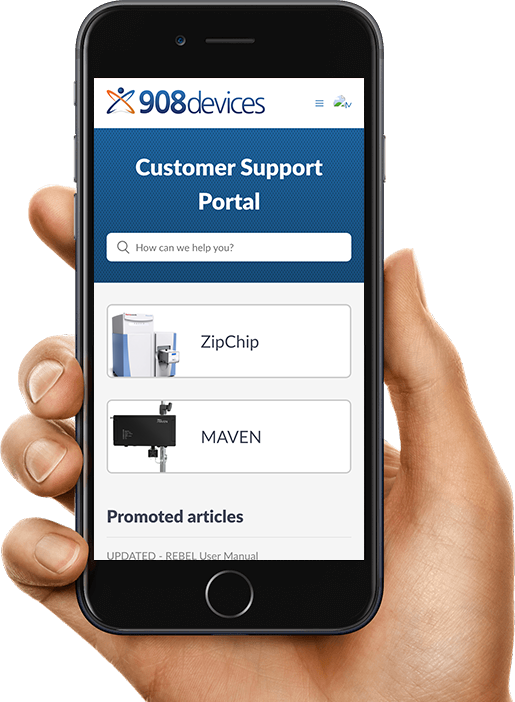
Customer Support Portal
The My 908 portal gives scientists quick access to important resources like the latest software upgrades, product guides, and training materials.
Frequently Asked Questions
Can the ZipChip interface to any mass spec?
The ZipChip currently interfaces to the following mass spec models:
Thermo Fisher: Orbitrap Exactive and Q Exactive Series, Fusion Lumos Tribrid, Orbitrap Exploris Series, Eclipse Tribrid, LTQ Series, Orbitrap Elite Series, TSQ2 Series Triple Quads.
Bruker: timsTOF/timsTOF Pro Series, maXis QTOF Series, impact QTOF Series, compact QTOF mass specs.
Sciex: TripleTOF 6600+, 6600, 5600, Triple Quad/QTrap 6500+, 6500, 5500+, 5500, 4500.
If you don’t see your mass spec listed, reach out to us.
The ZipChip is currently not compatible with Agilent or Waters mass spectrometers.
Can ZipChip be used to analyze small and large molecules?
Yes! The beauty of ZipChip is that you can perform large molecule (e.g., mAb’s) analyses in the morning and transition to small molecule (e.g., amino acids or peptides) analysis in the afternoon. It’s that fuss-free!
What are the most common applications that people use the ZipChip for?
The ZipChip is an open platform and isn’t restricted to any specific applications. However, there are applications that have been tested and validated internally by 908 Devices that we can supply Protocols and/or Application Notes for. These applications are:
Charge Variant Analysis – Profiling and identification of basic and acidic species of monoclonal antibodies or proteins.
Intact Mass/Glycoform Analysis – Rapid (>1min) molecular weight confirmation of intact proteins, as well as glycoform characterization.
Subunit/Middle Down Analysis – Characterization of Fc, Fd, and Light Chain (amongst others) mAb subunits for more detailed analysis.
Antibody Drug Conjugate (ADC) Analysis – Measure the Drug Antibody Ratio (DAR) of your ADC quickly and accurately.
Peptide Mapping – Profiling of complete enzymatic protein digestion in ~10 minutes with 95-100% sequence coverage.
Metabolomics/Small Molecule Analysis – Rapid quantitative analysis of metabolites and small molecules in biofluids (plasma, serum, urine, saliva, blood, etc), cell culture media, or plant material.
Oligonucleotide Analysis – Molecular weight confirmation of small oligonucleotides (up to 100 nt) without the need for Ion Pairing Reagents.
What benefits do ZipChip provide for Charge Variant Analysis (CVA) of mAbs?
ZipChip provides a clear separation profile of basic and acidic species, with minimal sample preparation and method development. Unlike traditional methods for characterizing charge variants, such as Imaging Capillary Isoelectric Focusing (iCiEF), Ion Exchange Chromatography (IEX), or Cation Exchange Chromatography (CEX), ZipChip provides the benefit of having a mass spectrometer as the detector. This allows for any species found to be properly identified. Compared to LC-MS, there is no need for fraction collection. This cuts down the time and effort it takes to analyze the samples. Charge Variant Analysis on ZipChip allows you to identify C-terminal lysine clippings, deamidated species, succinimide intermediates, and glycoforms, all in one fast analysis that usually takes between 7-15 minutes from start to finish.
What benefits do ZipChip provide for Intact Mass Analysis of mAbs?
Intact Mass Analysis on the ZipChip is extremely rapid, with the ability to confirm the molecular weight of a protein and collect glycoform information in under a minute. ZipChip is tolerant to both detergents and salts, therefore in most cases, it is only necessary to dilute the sample and directly load it onto the ZipChip.
What benefits do ZipChip provide for Subunit Analysis of mAbs?
Analyzing Fc, Fd, and Light Chain regions on the ZipChip allows for identification of Post Translational Modifications (PTMs), such as glycosylation, quickly and efficiently. With minimal sample preparation and fast analysis time, little to no carryover, and a high quality MS spectra, ZipChip is a great tool for Subunit Analysis of mAbs.
What benefits do ZipChip provide for Peptide Mapping (MAM) of mAbs?
To achieve a more detailed picture of the Post Translational Modifications that make up CQAs of a monoclonal antibody, it might be necessary to enzymatically digest the mAb into peptides and analyze them on a mass spectrometer. Traditionally this is done using a liquid chromatography system. However, the liquid chromatography system (LC-MS) can require a lot of sample preparation, method development, and exhaustive run times. With ZipChip, you can map the peptides of a mAb in under 10 minutes, with similar or superior results compared to an LC-MS setup. Due to the absence of a stationary phase, ZipChip also retains smaller peptides that may not bind to an LC-column. This results in a higher sequence coverage, usually between 95-100%.
What benefits do ZipChip provide for Metabolomics & Small Molecule Analysis?
Imagine trying to quickly sort and catalog every item in the market under time pressure. The ZipChip streamlines this process in the lab by preparing and separating a wide range of metabolites and small molecules for analysis with incredible efficiency. Using Capillary Electrophoresis (CE) integrated with Mass Spectrometry (MS), the ZipChip sorts metabolites based on their size and charge, allowing for extremely rapid, highly sensitive, and high-resolution analyses. ZipChip can handle a variety of sample types such as body fluids, cell culture media, tissue extracts, and other complex biological samples, making for a highly versatile metabolomic analysis platform.
What benefits do ZipChip provide for Oligonucleotide Analysis?
Analyzing oligonucleotides such as siRNAs, dsDNA, mRNA, on an LC-MS system requires the addition of ion pairing reagents. This creates significant background for any subsequent non-oligo analysis. This results in the need for extensive cleaning of the mass spectrometer, or a dedicated oligo-specific system altogether. There is no need for ion pairing reagents when analyzing oligonucleotides on the ZipChip, allowing for other applications to be run immediately following any oligo analysis. With rapid molecular weight confirmation, no carryover, and limited sample volume needed, ZipChip is a great tool for oligonucleotide analysis.
What Sample Preparation is needed for analysis on the ZipChip platform?
Minimal sample preparation is needed to run your samples on the ZipChip. Most formulation buffers – even those containing salts or detergent – are compatible with ZipChip analysis. Detergents will go to waste and never enter your mass spectrometer, whereas salt will migrate ahead of any analytes of interest. In many cases you only need to dilute your sample in our provided diluent, load your sample in the autosampler, and hit go!
What can I expect with regards to Method Development on the ZipChip?
Our application-specific protocols generally provide end-to-end solutions and are designed to minimize the method development and sample preparation needed. We provide complete application-specific kits, which includes diluent for your samples, as well as recommended mass spectrometer method parameters. In most cases no method development is needed and you can be up and running your samples in less than 30 minutes!
How does the ZipChip interface and control the MS acquisitions?
ZipChip is a plug-and-play device, all you need to do to get started is to remove the existing ESI source and attach the ZipChip. No alignment or adjustments are required. The ZipChip will start your mass spec at the right time, just like a chromatography station would do. The data acquisition is performed by your existing mass spec software, so the resulting data can be analyzed in the same way as you would analyze any other data acquired on your mass spectrometer.
What are some benefits of using ZipChip over a Liquid Chromatography (LC) system?
ZipChip is an orthogonal separation solution to liquid chromatography. In some cases it can serve as a direct replacement to LC with higher efficiency and ease-of-use. For example, the ZipChip separation can replace HILIC and/or ion-pairing RPLC for amino acids and similar compounds, often with superior results. ZipChip CVA can replace your ion exchange LC-MS method for protein charge variant analysis, with lower sample consumption and less method development. No one tool can do everything, but using ZipChip CE can be a powerful tool in your toolbox. Our Applications Team is here to help you overcome application challenges.
How does ZipChip help with analyzing Critical Quality Attributes (CQAs)?
In the context of pharmaceuticals, CQAs are the specific properties of a drug that must be measured to ensure the product’s quality, safety, and efficacy. The ZipChip quickly finds and measures the important features (CQAs) of a drug by separating the drug’s components quickly and accurately by charge and size, making it easier to see if the drug has the right qualities. The ZipChip is capable of analyzing different levels of CQAs by Charge Variant Analysis, Rapid Intact Mass/Glycoform Analysis, Subunit/Middle Down Analysis, and Peptide Mapping.
How does ZipChip utilize Capillary Zone Electrophoresis?
The ZipChip takes the basic idea of CZE and turbocharges it. It uses a microfluidic chip to perform Capillary Zone Electrophoresis, making it even faster and easier. It’s like upgrading from manual sorting to an automated, high-speed sorting machine, providing quick and accurate results for analyzing molecules. It’s very precise, can handle tiny amounts of sample, and works fast.
What does the CE in CE-MS mean?
Capillary Electrophoresis (CE) is a key component of the ZipChip system, serving as the primary mechanism for separating components of a sample based on their size-to-charge ratio in an electric field. The ZipChip integrates CE with mass spectrometry (MS) analysis, enhancing the capabilities of both techniques to provide rapid and efficient analysis of biomolecules such as proteins, peptides, and metabolites.
email Subscribe to Our Communications Signup to receive new product updates, technical tips and more.
